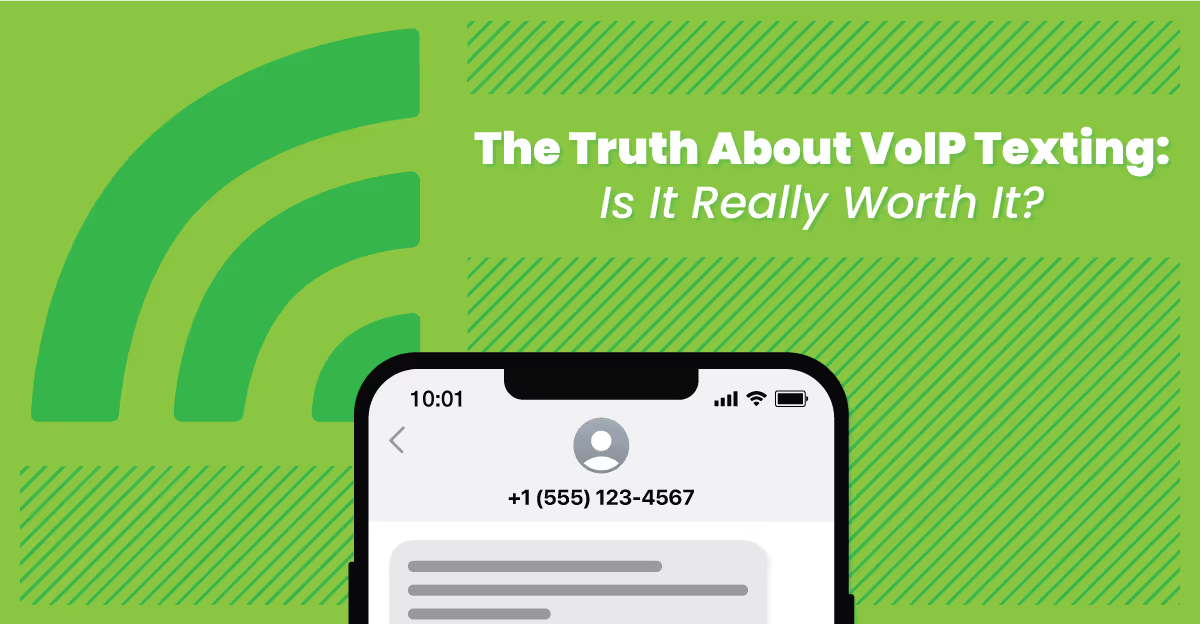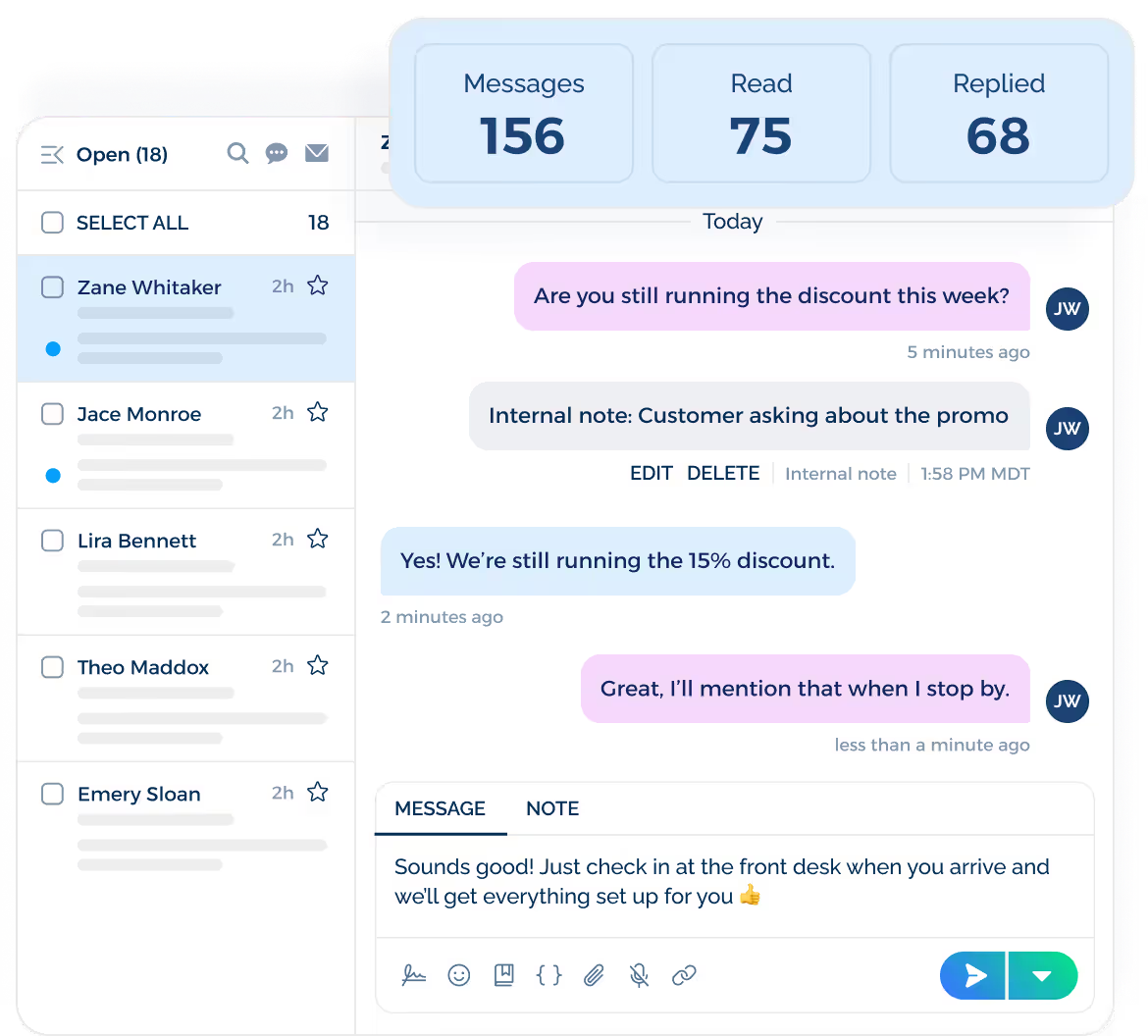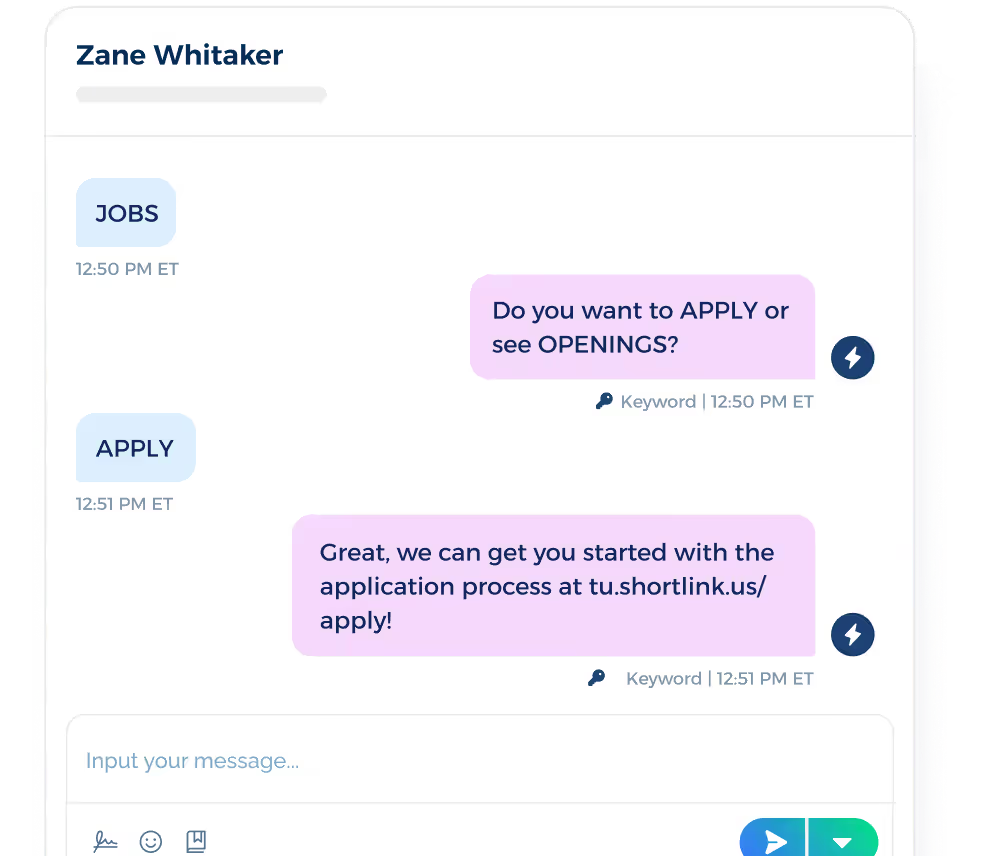The Truth About VoIP Texting: Is It Really Worth It?
What is VoIP texting and should you use it for your business? Learn about the disadvantages before deciding if it's the right fit.
Published
October 17, 2025

The idea of managing calls and texts from one platform sounds convenient, especially for busy teams. But texting through VoIP (Voice over Internet Protocol) doesn’t always work the way you expect.
When it comes to texting, reliability matters as much as convenience. Because VoIP runs on the internet, even a small glitch or weak connection can cause delays or poor message quality.
In this article, we’ll uncover if VoIP texting is worth it and see if it fits with your business workflow. You’ll also discover better ways to send messages without a VoIP, which offers the same flexibility but with quicker delivery and more consistent performance.
What Is VoIP Texting?
VoIP texting works by sending and receiving messages over the internet instead of using traditional cellular networks. You send texts through a VoIP phone system, which is the same setup that allows you to make and receive internet-based phone calls.
VoIP can also be used for text messaging, which is becoming increasingly popular due to its cost-effectiveness and convenience.
VoIP Texting vs Traditional SMS Messages
There’s a huge difference between VoIP texting and traditional SMS (Short Message Service).
Traditional text messages are delivered through mobile carrier networks, which are built specifically for message reliability and speed. VoIP SMS, on the other hand, travels through your internet connection.
Therefore, the quality and consistency of message delivery depend on your network’s speed and stability. Because messages depend on internet bandwidth, they can face delays, delivery errors, or failures when the network is unstable.
VoIP systems also use third-party gateways to send messages overseas, which can make delivery less reliable. This setup may also lead to unexpected international SMS fees or failed messages when you text customers in other countries.
If you rely on texting for customer service, scheduling, or marketing, these performance issues can turn into serious communication gaps.
The Disadvantages of VoIP for Texting Solutions
For many businesses, VoIP serves as a convenient, all-in-one communication tool to manage calls, texts, and video meetings from a single platform.
Many VoIP providers advertise flexible business use and connectivity through software applications. But it often brings compatibility issues and weaker security compared to traditional SMS services.
Therefore, it’s worth understanding that there are a few cons you need to consider before making the switch.
Reliability Issues
Unlike traditional SMS, which runs on carrier networks built for text delivery, VoIP texting depends on your internet connection. If your Wi-Fi signal drops or your cellular network slows down, your messages may not go through at all.
When bandwidth is low, texts can arrive late or fail. This creates a serious risk for companies as customers might never receive important messages such as confirmations, reminders, or updates.
Message and Call Quality
Because VoIP systems rely on data compression to send information, the quality of messages and voice calls can fluctuate depending on your connection. When your network is overloaded, messages might be partially sent or stripped of formatting and attachments.
MMS messages, such as photos, PDFs, or videos, can also experience problems, including failing to send or taking several minutes to go through.
This kind of inconsistency can harm customer satisfaction, especially for teams that need to remind customers or follow up in real time with personalized messages and automated responses.
Compatibility Limitations
VoIP texting isn’t universally compatible across all devices or networks. Some smartphones, softphones, and desktops need extra setup before they can send text messages or receive them.
VoIP phone numbers also behave differently from traditional phone numbers, which can confuse contact imports or CRM integration. Software applications that rely on real-time data may also not perform as expected when paired with certain VoIP platforms.
If your employees use a mobile device while traveling or work across multiple devices, this can result in communication gaps that slow productivity and response times.
Security and Privacy Concerns
Because VoIP texts travel through the internet, they’re more vulnerable to cyberattacks than traditional SMS platforms.
Without proper security measures or encryption, sensitive information may be exposed or altered by unauthorized users.
Some providers don’t secure messages end-to-end, which increases compliance risks for businesses that handle regulated or private data. If you're handling private or regulated information, this creates serious compliance and data protection challenges.
Number Portability Problems
In many cases, virtual numbers belong to the existing provider, not the user. So, if you cancel or switch platforms, you might lose your number entirely, which can be a problem if you’ve built long-term customer relationships.
Even if a provider allows porting, there are often fees or long delays involved. If you have built relationships over time, losing access to a main toll-free number can result in communication breakdowns with customers worldwide.
Regulatory and Compliance Challenges
Traditional telecom companies are bound by federal and state regulations that protect consumers and provide dispute resolution processes. However, VoIP texting services don’t always fall under the same set of rules.
This lack of regulation can cause problems when issues arise, as there may be limited legal recourse or accountability.
Also, some VoIP platforms don’t fully comply with industry standards such as TCPA (Telephone Consumer Protection Act), which could expose your business to legal risks.
Limited Customer and Technical Support
Most VoIP providers are built around voice functionality. Texting often feels like an added feature rather than a fully supported service.
This can lead to longer response times when you need help resolving delivery issues, message delays, or integration problems.
Some systems also lack features such as voicemail transcriptions or accurate message tracking, which are essential for maintaining communication. This limited support often pushes companies toward dedicated texting solutions that offer real-time monitoring, analytics, and reliable delivery.
SMS marketing software is more cost-effective and helps you save money in the long run. They make it easy to receive text messages without disruptions and maintain consistent communication across teams and customers.
Why SMS Remains the Most Reliable Business Channel
If you constantly communicate with customers, SMS marketing is the most direct and impactful one you have. People check their mobile phones continually, and texts are read almost immediately after they arrive.
According to industry data, 98% of texts are opened within minutes, compared to an average 20% open rate for emails.
That gap shows why SMS in modern industries has become one of the most effective ways for businesses to reach customers and strengthen the overall customer experience.

But while the importance of texting keeps growing, how you send those messages matters just as much as what you say. If your texts are delayed, fail to deliver, or show up out of order, the result can be missed calls, unhappy customers, or lost revenue.
This is where relying on VoIP text messaging can get risky. It’s simply not built for the level of dependability your business requires when every message counts.
How TextUs Delivers Dependable Business Text Messaging
While VoIP service systems are ideal for managing calls, they often struggle to deliver the same level of dependability when it comes to texting.
With TextUs, you can do more than send text messages. This texting software offers advanced features designed to handle conversations across multiple recipients and manage scheduled messages.
Here’s what makes TextUs valuable for your business:
Real-Time Message Delivery and Reliability
One of the biggest challenges with VoIP texting is message delay or loss due to unstable internet connections. TextUs avoids this by sending messages through cellular networks, ensuring that texts are delivered in real time, even when your internet connection fluctuates.
You get the same flexibility as any VoIP solution, but without worrying about delivery issues. When you start texting appointment reminders or time-sensitive updates through TextUs, they arrive on time, every time.
Unified Business Number for Calls and Texts
TextUs allows you to use your existing business number for texting and calling, just like VoIP systems. The difference is that TextUs provides consistent, carrier-grade message delivery while keeping a streamlined communication.
Your customers can call or text the same number, and your team can manage both from a single, easy-to-use dashboard. This makes it easier to handle communication with more than one person at a time while maintaining professional service.
Two-Way Conversations to Boost Engagement
TextUs helps your sales and customer support teams create two-way conversations that feel authentic. You can schedule texts, automate follow-ups, and create automated messages for quicker replies.

With shared inboxes, multiple team members can view and manage conversations at once to prevent missed messages or delayed responses.
You can also send and manage marketing campaigns from the mobile app while you’re away from your desk, or use the Chrome extension inside your CRM.
What sets TextUs apart is that it can provide deep insight into your performance. You can track delivery rates, response times, and engagement trends using built-in analytics dashboards.
These reports help you identify which messages resonate with your audience and which ones need improvement. With visual charts and trend analysis, you can make data-backed decisions that strengthen your communication strategy.
CRM Integration and Analytics
TextUs integrates with popular CRM and marketing tools like Salesforce, HubSpot, and Microsoft Dynamics. These integrations make it easy for your team to manage all customer communication in one place without switching platforms.
When you have TextUs embedded into your CRM, you can plan and execute SMS campaigns from your workflow. You can track performance, assign conversations, and analyze engagement right inside your existing tools.
Build More Pipeline Through SMS Automation and Campaigns
TextUs doesn’t stop at one-on-one texting. You can send personalized SMS marketing campaigns to larger contact lists without worrying about delivery failures or network delays.
You can automate outreach, create targeted text marketing campaigns, and build drip sequences that nurture leads over time.
The platform supports keyword-triggered campaigns where customers can reply with specific terms to receive auto-reply responses or personalized follow-ups instantly.

TextUs also supports rich media and plain text messages, so you can send PDFs, links, and images under a multi-channel approach that reaches customers wherever they are.
Security and Compliance for Business Messaging
Unlike some VoIP systems that lack strong message protection, TextUs is built with compliance and privacy in mind.
The platform helps you adhere to TCPA compliance by managing opt-ins, opt-outs, and registration requirements automatically. It also supports 10DLC registration, which allows you to send texts from local numbers while improving deliverability.
Security is another area where TextUs outperforms VoIP texting. Because messages are routed through secure carrier networks rather than open internet connections, the risk of interception or delivery failure is much lower.
Your customer conversations stay private and protected, and your business avoids potential legal or reputational issues that can arise from noncompliant texting.
Scalable and Easy to Use
TextUs is designed to grow alongside your business. You can handle unlimited campaigns, expand your contact base, and add users as your team grows without needing extra hardware or complicated setup.
The platform is user-friendly, so your staff can start sending messages and managing campaigns almost immediately after onboarding.
Every feature, from campaign scheduling to analytics, is designed to simplify your workflow, not complicate it. Even at scale, TextUs maintains its reliability and message quality.
Switch to Reliable Texting That Keeps You Connected—Try TextUs!
When your business depends on fast communication, you need a solution that works every time. That’s why more companies are switching to TextUs, a platform built specifically for dependable, real-time texting.
With TextUs, messages are sent instantly through carrier networks, not unstable internet connections. You can manage real conversations, automate campaigns, and track engagement from one easy-to-use dashboard.
TextUs also connects with your CRM, so your team can send messages, schedule follow-ups, and view results. It’s built for modern businesses that value speed, consistency, and real connection.

If you’re tired of dropped texts and uncertain delivery, it’s time for an upgrade. Book a demo with TextUs and discover a faster way to reach your customers and grow stronger relationships!
FAQs About VoIP Texting
Can you text via VoIP?
Yes, you can use VoIP texting through a virtual phone number, but message delivery depends on your internet connection. It’s typically slower and less dependable than standard carrier texting.
If your goal is to send important messages quickly and consistently, a dedicated SMS platform like TextUs is a better choice. It avoids VoIP calls and connection issues by using carrier networks instead, offering faster message delivery.
Why would someone text using a VoIP number?
People often text using a VoIP number because it lets them manage both calls and messages from one platform. It’s convenient for companies that already use Google Voice or similar VoIP systems for business communication.
However, while the benefits of VoIP include flexibility and affordability, message performance may suffer. VoIP systems can experience delivery delays or missed texts, especially when handling time-sensitive conversations.
An SMS marketing platform like TextUs provides automation, analytics, and stronger messaging capabilities without the same reliability issues.
Is TextNow a VoIP app?
Yes. TextNow is built on VoIP technology, which allows users to send texts and make calls using the internet instead of a traditional carrier. However, since it relies on an internet connection, the delivery and speed of messages can vary depending on your network.
For business communication, tools like TextUs are more suitable because they’re designed specifically for professional texting. TextUs connects directly to carrier networks, offers automation features, and integrates with CRMs.
Can VoIP texts be traced?
Yes, but with some limitations. Online service providers manage VoIP numbers. Therefore, messages can be traced back to the VoIP provider’s servers or account holder, not to a specific physical device.
Law enforcement or the VoIP provider can sometimes access message logs, IP addresses, or account information when required by a warrant or investigation.
Continue Reading
Frequently Asked Questions
Business Texting
Built for Results
Create and convert pipeline at scale through industry leading SMS software




